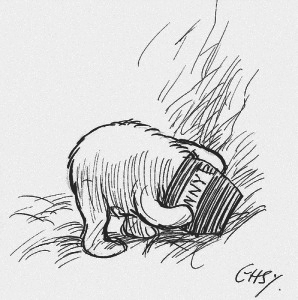Most social scientists aren’t beekeepers and small-scale farmers, but Lisa and I are.
We normally rob our bees (a.k.a., harvest honey) in mid-August, but this year the bees have been unusually productive so we needed to empty out a couple supers in mid-June. We put on our bee suits, grabbed the honey from the hives, and took it back to our potting shed where we cut off the outer layer of wax then put the frames in a large hand-powered centrifuge called an extractor, which has better connotations for a beekeeper than it would for a dentist. We spun out 6 gallons of honey that afternoon.
Extracting honey is sticky business.
It’s a good thing we have a sink and soap in the potting shed, because we wash our hands like folks with obsessive-compulsive disorder when we extract honey.
Wouldn’t it be nice to have a reset button? Just press the button and your mind releases the little hassles, the beauty of life comes into focus, and you experience deep gratitude.
I noticed this year that every time Lisa headed to the sink, she would first taste the honey coating her fingers and each time I heard the same expression of delight: “Mmmmm.”
Her enthusiasm was contagious, and for good reason, it turns out. The honey was perfect. We laughed and celebrated and pondered this glorious life as we spun the centrifuge, filled jar after jar, and then ate biscuits and honey for dinner.
I don’t manage it every day, but I want to live like this.
Lisa’s exuberant moan of delicious gladness was almost involuntary, as if gratitude requires sound effects. That’s how I want to live, and not just in response to honey. I want to sigh in delight when I see the hills on the horizon or breathe the crisp air of an autumn morning, when I visit with my children and grandchildren, when I encounter a fresh idea, and when I reflect on the joy of good work.
I want to be a grateful soul.
But honestly, I get bogged down. Sometimes it seems there are so many dissertations to read, weeds to hoe, emails to answer, a strained relationship to address, and my sighs of delight stop coming for a day, or six, or twelve at a time.
This, it turns out, is my internal wrestling match. I want to be grateful for all sorts of reasons, some of them quite self-focused.
Grateful people are happier, healthier, more forgiving, hopeful, and optimistic than others. The scientific research of the past decade is absolutely compelling. Those who are grateful cope better, recover better from trauma, and have more empathy for others. Oh how I want to be grateful. But like the Apostle Paul wrestling with the problem of sin in the last part of Romans 7, I find that my desire to be grateful finds a frightful foe in the daily tensions of life.
Wouldn’t it be nice to have a reset button? Just press the button and your mind releases the little hassles, the beauty of life comes into focus, and you experience deep gratitude.
Wait. Maybe there is a reset button.
On most Sundays, attending church centers my scattered soul. I sit with other friends, sing praises to God, hear words of wise instruction, and share life with those older and younger than me. Even if I come to church a tattered pilgrim, I leave with joy and gratitude.
Why is it that a decade of research on gratitude has so rarely included the effects of faith communities and ministries?
There are all sorts of reasons for gratitude research to consider faith communities. I’ll mention just two here.
The Upward Spiral
In a now-classic study on gratitude, psychologists Robert Emmons and Michael McCullough randomly assigned university students to complete a gratitude journal over a period of ten weeks.
One comparison group kept a journal of life hassles while another simply journaled about the events of life. Some of the benefits the researchers discovered for gratitude were predictable: those keeping a gratitude journal reported more favorable life ratings at the end of the study, and they were more optimistic.
Other findings were more surprising. For example, those in the gratitude condition visited the student health center less often than those in the other two journaling groups, and they exercised more. Emmons and McCullough repeated the study with a group of adults with neuromuscular disease and found similar results.[1]
In the discussion section of their journal article, Emmons and McCullough explore the possibility of an “upward spiral” where gratitude enhances psychological, social, and spiritual resources. These resources, in turn, cause us to reach out to others in prosocial ways and in the process we build relational bonds. And, not surprisingly, meaningful relationships make us more grateful. So the spiral continues upward, bringing personal and community health in the process.
Just think about how many aspects of this upward spiral are present in healthy church communities. Worship provides frequent reminders of why and how we can be grateful. Outreach ministries provide practical ways to reach out and be prosocial toward others. Relationships are built and developed week after week, and most often they give us reasons to be increasingly grateful for the blessings of this good life.
Bigger Than Me
Here’s another reason for gratitude research to consider faith communities: faith points us toward transcendence.
It might be tempting to view gratitude as a response to a personal gift or blessing. I’m grateful for a good marriage, for example, and for a house to sleep in when it gets cold outside. This is true enough, but the more scientists study gratitude the more it seems clear that the deepest forms of gratitude also have a transcendent dimension. It’s not just about me.
Sometimes I get this as I walk or drive along rural roads in Oregon, allowing myself to be mindful of the beauty of the day. The cloud formation, the sun peeking through, the majestic profile of Mt. Hood, the smell of Douglas Fir, the birdsong, the budding of new life, all of it awakening me to blessings that are far more than personal gifts. These blessings are ubiquitous, available to all, and they sing out transcendence. Someone much bigger and better than me has gifted this world with beauty, and whenever I pause to see it my proper response is to smile in grateful delight.
Church communities are built on the assumption of transcendence. At least in the best instances, church stretches us toward fulfillment of our deep existential and relational yearnings. As Frederick Buechner writes in A Room Called Remember, we come to church with “muck on our shoes.” We’re weary from the journey, intuitively sensing some homeward nudging that calls us beyond the smallness of everyday living. We come to church because we sense the need for a completeness that we cannot find on our own.
Church is not just about us, thank God, and neither is gratitude.
What prompts you to gratitude? How do your faith and experience in faith communities help promote gratitude?
Concluding Scientific Postscript: Gratitude Research Goes To Church
Have I convinced you that faith communities might be a good place for some gratitude research? It’s about to happen.
This series of reflections that I am writing for The Table emerges from a John Templeton grant that funds five dissertations investigating positive psychology and the Church. One of these dissertations will be completed by Jens Uhder, a George Fox doctoral student who formerly completed a masters degree with Dr. Philip Watkins, a gratitude researcher at Eastern Washington University. Mr. Uhder and I will be studying the effects of a gratitude intervention in two church communities.
Gratitude research is going to church. I am excited about Jens’s study and grateful for the Templeton Foundation funding that makes it possible.
References


